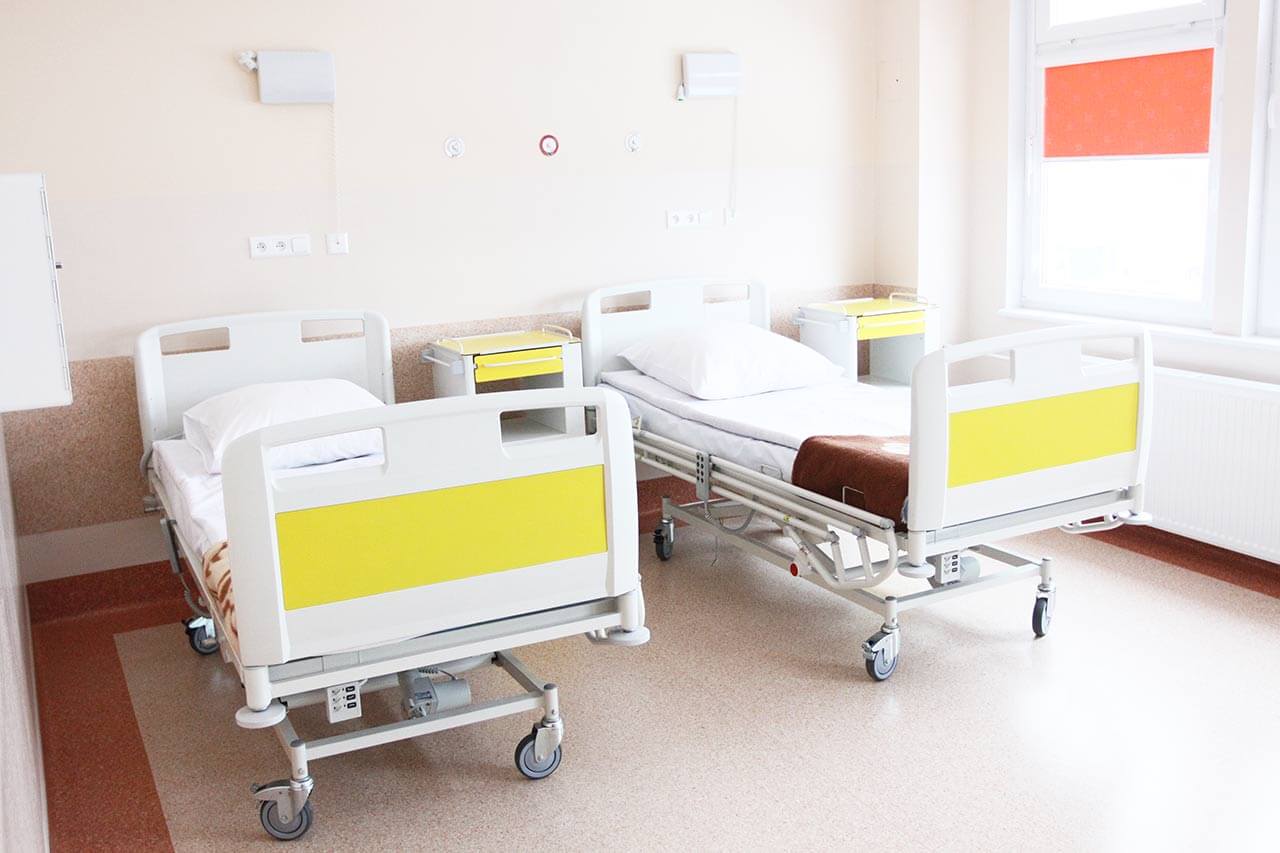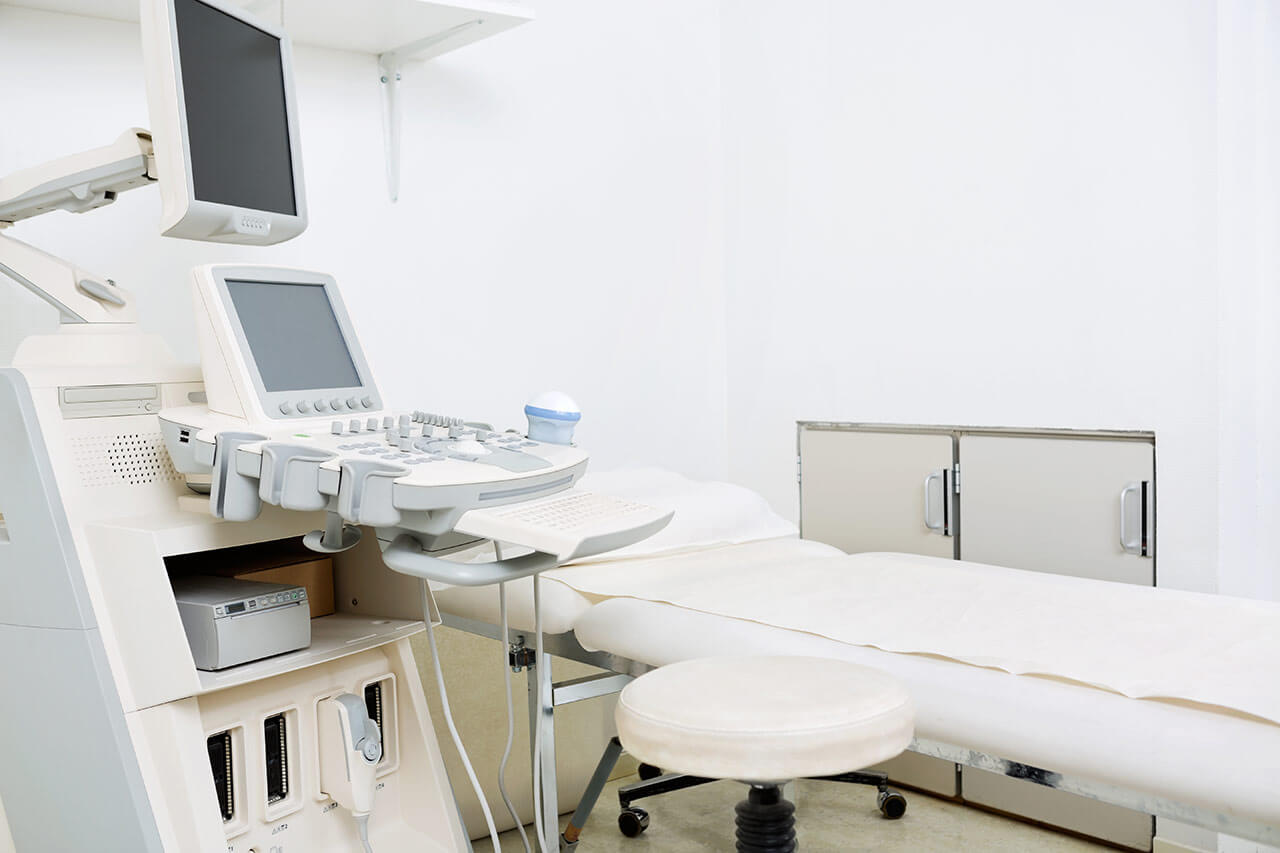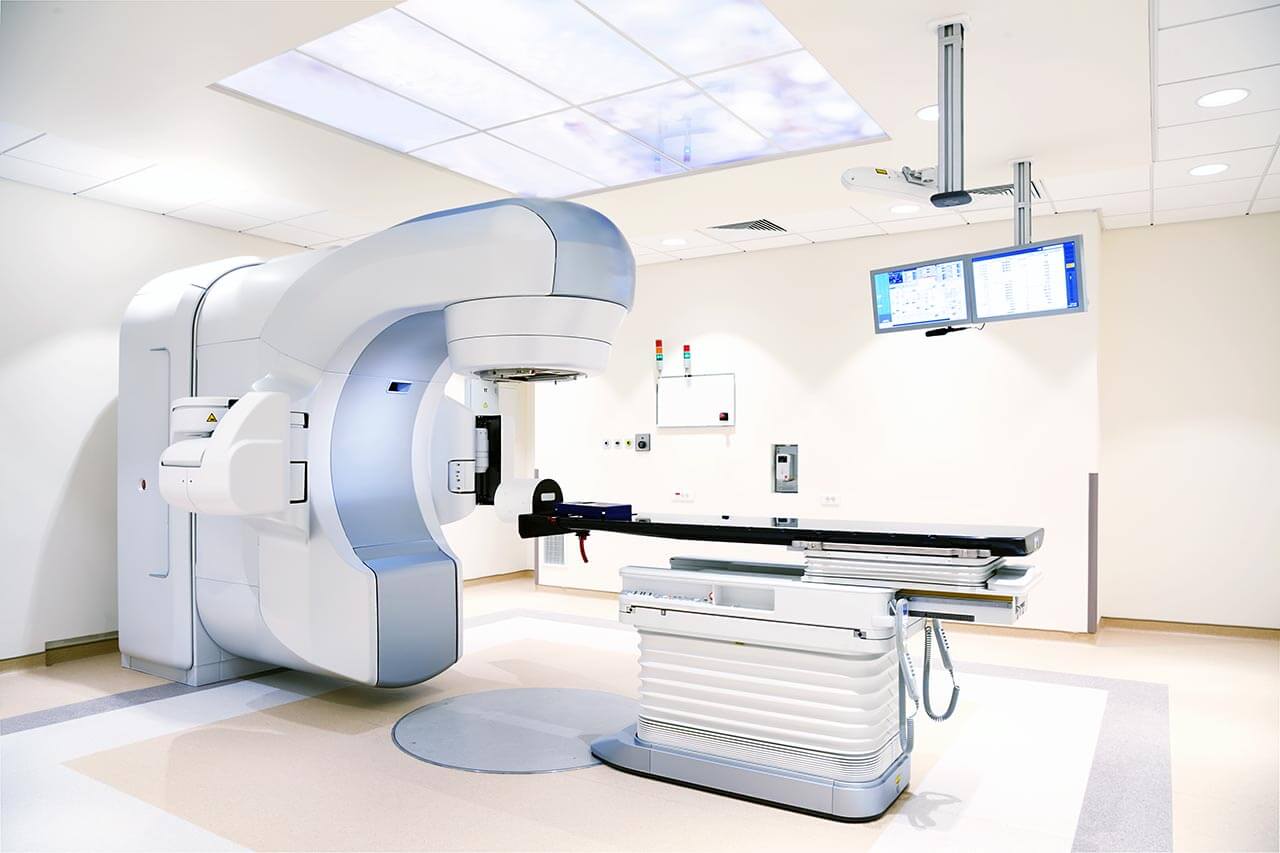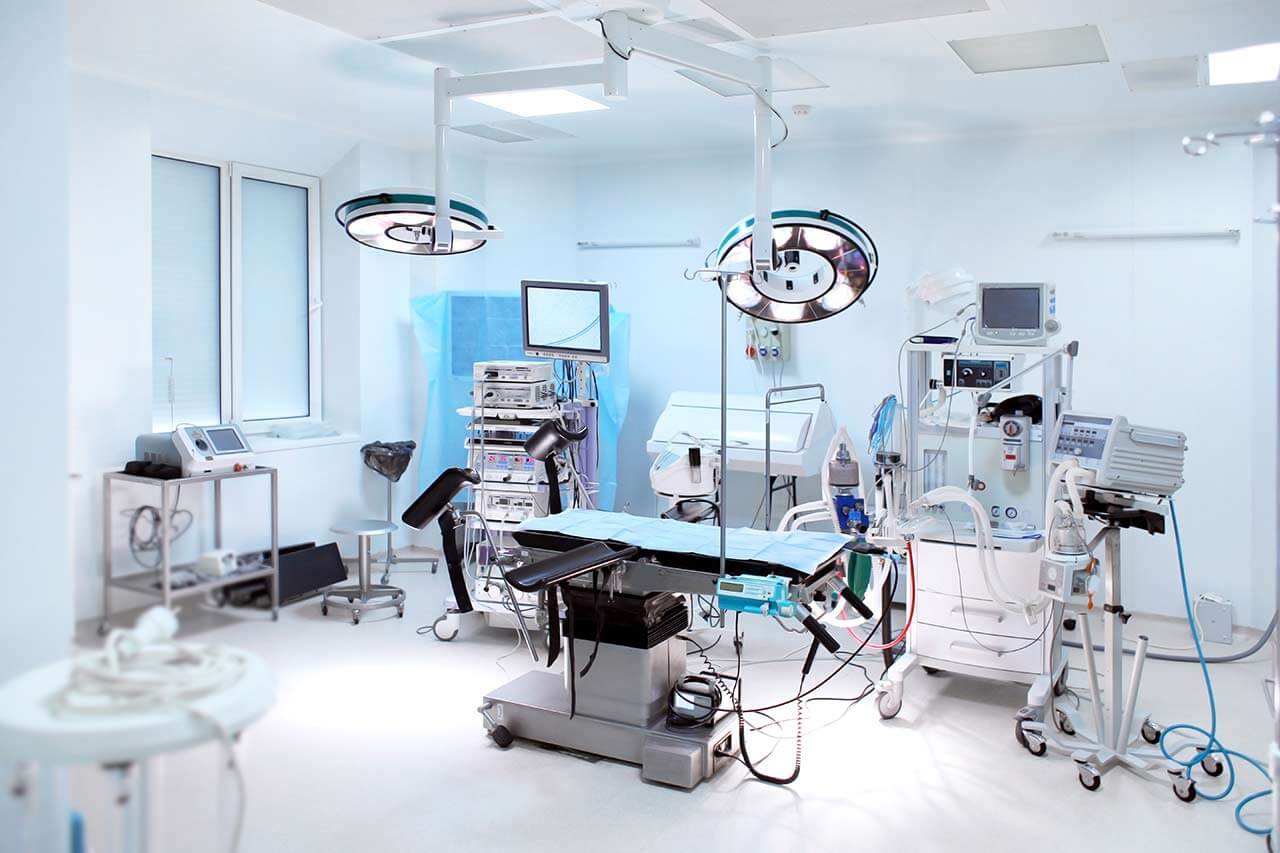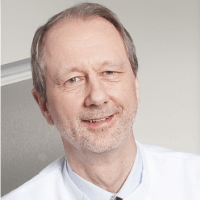
The program includes:
- Initial presentation in the clinic
- clinical history taking
- review of medical records
- physical examination
- laboratory tests:
- complete blood count
- biochemical analysis of blood
- inflammation indicators (CRP, ESR)
- TSH-basal, fT3, fT4
- indicators of blood coagulation
- CT planning of radiation therapy
- full course of conventional radiation therapy
- symptomatic treatment
- cost of essential medicines and materials
- nursing services
- control examinations
- consultations of related specialists
How program is carried out
During the first visit, the doctor will conduct a clinical examination and go through the results of previous laboratory tests and instrumental examinations. After that, you will undergo an additional examination, including complete blood count, laboratory assessment of liver and kidney function. Based on the received results, the physician will conduct radiotherapy planning with the help of CT or MRI, make the permanent tattoo marks on the skin and conduct CT simulation in order to assess the accuracy of the rays and the radiation dose. If necessary, related medical specialists will be involved in the elaboration of a treatment regimen (tumor board).
Radiation therapy is carried out as the day hospital procedure, without mandatory admission to the hospital. At each visit, the physician will assess your general condition and the marks on the skin. After that, you will be placed in a shielded radiation therapy room, on a special table.
Each radiation therapy session lasts less than half an hour (including preparation). All this time, doctors and nurses are monitoring your condition, you can communicate with them through a loudspeaker. The procedure is completely painless. Depending on the planned course of treatment, you will visit the hospital from 1 to 3-5 times a week.
After the completion of the radiation therapy course, you will undergo control examinations aimed at assessing your condition and efficacy of treatment. After that you will receive the medical report with detailed recommendations regarding further follow-up and treatment. In the future, you will be able to have a distant consultation with your attending physician and schedule the next course of treatment, if necessary.
Required documents
- Medical records
- MRI/CT scan (not older than 3 months)
- Biopsy results (if available)
Service
You may also book:
 BookingHealth Price from:
BookingHealth Price from:
About the department
According to the Focus magazine, the Department of Adult and Pediatric Radiation Therapy, Radiation Oncology at the University Hospital Duesseldorf is included in the rating of the top German departments specializing in radiation therapy!
The department offers the full range of treatment of oncological diseases using ionizing radiation by means of external (teletherapy) or internal (brachytherapy) tumor radiation. The specialists of the department are doing their best to ensure the most effective cancer therapy, taking into account the very latest advances in science and medical technology, interdisciplinary cooperation and an individual approach. The Chief Physician of the department is Prof. Dr. med.
Wilfried Budach.
Teletherapy is based on a multimodal concept for treating breast cancer, prostate cancer, head and neck tumors, lung cancer, abdominal tumors and whole-body radiation. Radiosurgery and intensity-modulated radiation therapy refer to the most advanced radiation methods and are used in complex clinical cases (for example, localization of cancer in the brain, head and neck or in the abdominal cavity). Brachytherapy is used as an independent method or as an addition to teletherapy for the treatment of gynecological tumors, ENT tumors, lung, esophageal and soft tissue tumors.
The department specializes in the treatment of the following diseases:
- Malignant pathologies
- Gastrointestinal tumors
- Tumors of the genitourinary system in men
- Head and neck tumors
- Sarcomas (soft tissue and bone tumors)
- Tumors of the female reproductive system, including breast cancer
- Lung cancer
- Tumors of the central nervous system
- Skin tumors
- Pediatric tumors (for example, medulloblastomas, ependymomas, leukemias)
- Malignant lymphomas
- Benign pathologies
- Degenerative and inflammatory diseases of the joints and soft tissues
- Excessive scarring (keloid scars)
- Chronic painful changes in the joints (arthrosis)
- Calcium salt deposition in soft tissues (heterotopic ossification)
- Orbital inflammatory diseases (endocrine ophthalmopathy)
- Benign tumors of the central nervous system (for example, meningiomas, craniopharyngiomas, acoustic neuromas, pituitary adenomas)
- Other benign and malignant diseases
The therapeutic spectrum of the department:
- Imaging-guided conormal radiation
- Intensity-modulated radiation therapy (IMRT)
- Volumetric modulated arc therapy (VMAT)
- Stereotactic high-precision irradiation
- Stereotactic radiosurgery
- Imaging-guided radiation therapy (IGRT)
- Total body irradiation as a preparation for bone marrow transplantation
- Palliative care
- Other treatment methods
Curriculum vitae
- 1978 - 1985 Study of Human Medicine at the Universities of Heidelberg and Kiel.
- 1985 Admission to medical practice, Military Doctor during the military service.
- 1986 Doctor of Medicine, University of Kiel.
- 1986 - 1991 Assistant Physician, Radiology Center at the University of Essen.
- 1991 Medical Specialist in Radiology.
- 1991 - 1992 Research Fellow (Scholarship of the German Research Foundation, 5 months), Department of Radiation Oncology at the Massachusetts General Hospital, Harvard Medical School, Boston, USA.
- 1992 - 1995 Medical Specialist in the Department of Radiotherapy, University Hospital Essen.
- 1995 Habilitation in Radiation Oncology and Venia Legendi, PD title.
- 1995 - 2004 Leading Senior Physician, Department of Radiation Oncology, University Hospital Tübingen.
- 1996 Medical Specialist in Radiation Therapy.
- 1997 Hanns Langendorf Prize of the Association of German Doctors for Radiation Protection and Hanns Langendorf Foundation.
- 2001 Extraordinary Professor.
- 2004 Head of the Department of Adult and Pediatric Radiation Therapy, Radiation Oncology, University Hospital Duesseldorf (C4 Professor).
- 2012 Congress President of the 32nd Annual Meeting of the German Society of Senology in Stuttgart.
- 2013 Honorary Member of the Belgian Society of Therapeutic Radiology and Oncology.
- 2014 Congress President of the 20th Annual Meeting of the German Society of Radiation Oncology in Duesseldorf.
- 2015 - 2017 Chairman of the Group on Radiation Oncology of the European Organization for Research and Treatment of Cancer (EORTC).
- 2017 President of the German Society of Radiation Oncology (DEGRO).
- Member of various commissions engaged in the development of S3 guidelines for the treatment of breast cancer, stomach cancer, colorectal cancer, oral tumors and laryngeal cancer of the German Cancer Society.
- Experience as a Research Manager and Member of the Research Commission (more than 20 clinical trials in radiation oncology).
- Author of over 240 publications.
Photo of the doctor: (c) Universitätsklinikum Düsseldorf
About hospital
According to the authoritative Focus magazine, the University Hospital Duesseldorf ranks among the top Germany hospitals!
The hospital is an excellent example of a combination of high-quality health care, research and teaching activities. With more than 50,000 inpatients and about 300,000 outpatients every year, the hospital is one of the largest and most prestigious medical institutions in Germany and Europe.
Modern, safe and sparing diagnostic and therapeutic methods guarantee effective treatment of various diseases and their consequences. All therapeutic processes are based on an interdisciplinary approach, which provides comprehensive medical care and optimal treatment result. Obviously, one of the key roles in the successful clinical practice of the medical institution is played by a highly qualified medical personnel, which consists of the best world-class doctors. The hospital also has a special advantage due to the structured equipment with the innovative medical technologies.
The hospital presents almost all fields of modern medicine. Special attention should be given to such focuses as oncology and hematology, stem cell transplantation, neurosurgery and neurology, urology, obstetrics and gynecology, hepatology, kidney transplantation, vascular surgery, cardiac surgery, pediatric surgery, pediatric oncology, etc.
In addition to the outstanding quality of medical services, the hospital guarantees each patient an attentive care, friendly atmosphere, as well as sensitive and respectful attitude.
Photo: (с) depositphotos
Accommodation in hospital
Patients rooms
The patients of the University Hospital Duesseldorf live in comfortable single, double and triple rooms. The patient rooms are made in bright colors and modern design. The room furnishing includes an automatically adjustable bed, a bedside table, a wardrobe, a telephone, a multimedia device (TV, radio, Internet access), a table and chairs for receiving visitors. To use the phone and multimedia device, the patient should have a special chip card, which can be purchased at the reception. In the pediatric departments multimedia device can be used for free.
Meals and Menus
The patients of the hospital are offered a varied, tasty and healthy diet. Every day there are three menus to choose from for adults and four menus to choose from for children, while it is possible to develop an individual menu. When pre-ordering, the international patients may have dishes of various cuisines of the world, for example, Asian and African cuisine. If a patient needs a diet in accordance with the clinical indications, he will be provided with a special diet menu, including drinks.
Every day, the nurses inform the kitchen workers about the patient wishes using an electronic data processing system. Immediately before serving food, there are printed special cards, which indicate for which patient this or that dish is intended.
Also, the hospital houses a cafeteria with a rich selection of delicious, healthy dishes, snacks and drinks.
Further details
Standard rooms include:
Religion
Christian priests are available for the patients at any time. Representatives of other religions may be requested at any time.
Accompanying person
Your companion may stay with you in your room or at a hotel of your choice during the fixed program.
Hotel
You may stay at the hotel during the outpatient program. Our employees will support you for selecting the best option.
The hospital offers a full range of laboratory tests (general, hormonal, tests for infections, antibodies, tumor markers, etc.), genetic tests, various modifications of ultrasound scans, CT scans, MRI and PET / CT, angiography, myelography, biopsy and other examinations. Treatment with medications, endoscopic and robotic operations, stereotaxic interventions is carried out here, modern types of radiation therapy are also used. The hospital offers patients all the necessary therapeutic techniques.
- Dermatosurgery
- Skull base surgery
- Gastric bypass and bandage
- Removal of lung metastases
- Interventions on the spine
These are skin cancer (including melanoma), head and neck tumors, pathological changes in the chest (including funnel chest), obesity, liver diseases, HIV and other infectious diseases, varicose veins, aortic aneurysm, carotid artery stenosis, joint diseases and other pathologies.
- Dermatology
- Oncology
- Otorhinolaryngology
- Endocrinology and diabetology
- Orthopedics and traumatology
Over 800 highly qualified physicians work at the hospital.
